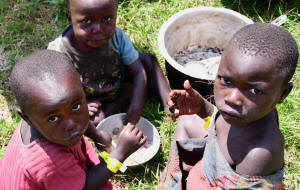Africa's most vulnerable hit by Russia's war in Ukraine, says IMF
 Send a link to a friend
Send a link to a friend
 [April 28, 2022]
By Andrea Shalal and Rachel Savage [April 28, 2022]
By Andrea Shalal and Rachel Savage
WASHINGTON/LONDON (Reuters) - Russia's
invasion of Ukraine has delivered a further "huge negative shock" to
sub-Saharan Africa, driving food and energy prices higher and putting
the most vulnerable people at risk of hunger, the head of the IMF's
Africa Department told Reuters.
The food security crisis had piled pressure on countries already
grappling with a protracted COVID-19 pandemic, disrupted education, loss
of income and serious debt problems, Abebe Aemro Selassie said in an
interview. That is making it difficult for those countries to mitigate
the impact of inflation, he said.
All those factors also stoked the chances of social unrest, the
International Monetary Fund (IMF) said in its biannual regional economic
outlook for sub-Saharan Africa, published Thursday.
"It's a recipe for very, very difficult policymaking, but also the
social environment," Selassie said. "This is a crisis, which is almost
laser-focused on hitting the most vulnerable people in the most
vulnerable countries acutely."
Russia's invasion of Ukraine began on Feb. 24. Moscow calls its actions
there a "special operation".
Last week, the IMF revised sub-Saharan Africa's estimated gross domestic
product growth for 2021 up from 3.7% to 4.5%, but forecast it would fall
to 3.8% this year.

It cut its 2022 growth predictions for oil importers by 0.4 percentage
points, and by 0.5 percentage points for a group of 20 so-called
"fragile states". The region's eight oil exporters had their growth
forecast revised up by 0.8%.
The IMF raised its forecast for average regional inflation by a full 4
percentage points, which would be the worst outcome since 2008.
Inflation would hit double digits in 11 countries, of which almost half
were fragile.
The report said food security was already a critical issue across the
Sahel area, in the Democratic Republic of the Congo, and Madagascar,
with food accounting for about 40% of consumption across the region, a
far larger share than anywhere else.
[to top of second column]
|

Congolese children share a meal at a temporary camp after fleeing
from the renewed fighting between the assailants and army troops of
the Democratic Republic of Congo and Uganda, at the Bunagana border
crossing point in Western Uganda November 10, 2021. REUTERS/Abubaker
Lubowa
 It said central bankers were caught
between trying to control inflation and promote economic growth,
while commodity importers in particular had limited fiscal bandwidth
while struggling with increasing debt burdens.
Selassie said he was particularly worried about social unrest in
countries in the Sahel and others that were already food-insecure
and facing significant security challenges.
"This is layering on top of all of that," he said. "What happens in
the Sahel is not going to stay in the Sahel. It's going to drift to
the more littoral states and other countries."
The IMF was in intense discussions with the World Bank, the World
Trade Organization, and the U.N. Food and Agriculture Organization
about which countries would be hardest hit, he said.
Countries were already requesting emergency financing or added
funding under existing IMF programs, as well as more leeway in
parameters for reaching economic targets, Selassie said, declined to
identify the countries in question.
"I cannot think of a higher priority right now than making sure that
this food security challenge is addressed head-on for the most
vulnerable households," he said.
Advanced economies were aware of the problem, but needed to
translate their concerns into incremental financing for countries at
risk, he added.
(Reporting by Andrea Shalal in Washington and Rachel Savage in
London; Editing by Kenneth Maxwell)
[© 2022 Thomson Reuters. All rights
reserved.] This
material may not be published, broadcast, rewritten or
redistributed.
Thompson Reuters is solely responsible for this content.
 |